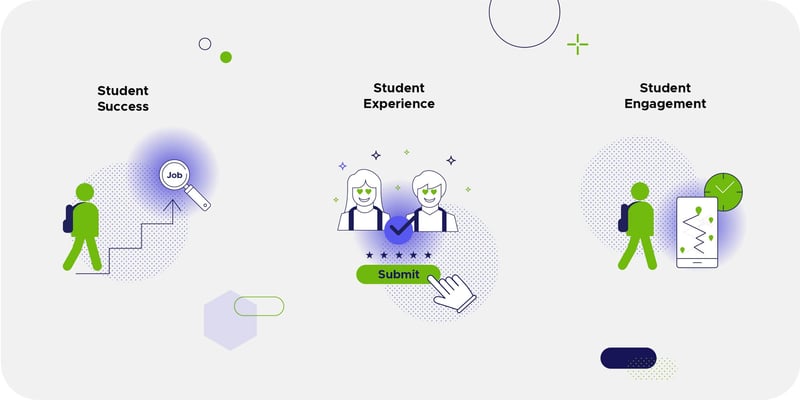Improve the student experience by applying student management software that will enhance and shorten processes for staff and students.
Today’s students want to be heard. College students want to feel that their needs are being fulfilled and that the college they’ve chosen is paying attention and providing the experience they are looking for.
A survey shows that up to 32% of college administrators indicated that improving the overall student experience was their top challenge. While universities and colleges are constantly competing to attract and retain the best-fit students by offering excellent faculty, learning programmes, and student amenities, administrators often overlook the need to transform the on-campus experience.
Consequently, colleges and universities need to focus on analyzing, and improving the student experience. Still, many barriers stand in their way. Experts believe this is because these institutions do not know how to define “student experience” or they are conflicted with “student success” or “student engagement”, while others think that their organizational silos are getting in the way or that colleges are struggling to adapt to these new (primarily technological) demands.
According to Brightspot research, colleges and universities are picking their preferred right combination of methods between quantitive and qualitative data; campus data with external peer/industry benchmarking data and subjective data like satisfaction with objective data like utilization.
Some of the tools and formats they might encounter when doing this are:
- Mining existing data.
- Looking at ratings and review sites.
- Conducting surveys and observations.
- Facilitating forums, focus groups, and interviews.
- Engaging students in journaling or photo essays.
In order to gather data and insights from the students and improve their experience on each campus, smart and effective technologies have been developed with that purpose in mind, taking colleges to the next level.

The Importance of Providing a Great Student Experience
Students’ mental health is being challenged more than ever. They do not only feel the pressure of a new stage in their lives with more decisions making, but this specific flow of students have had their educational norms altered by Covid-19, affecting how their generation interacts with evolving educational practices.
As a result, college administrators are under immense pressure to provide students with the support they need to navigate their situations.
The use of technology to schedule and manage student appointments and flow on campuses has surged into becoming the new norm. Today, there are practical solutions that can create a better student experience that helps reduce stress levels across the whole campus.
Through the use of queue management and appointment booking technologies, student and staff experiences can be completely transformed for the best. Resulting in more enrollments, better mental health, and happy students working with productive staff members.
But first, in order to achieve this outcome, it is important to understand the key components that go into it:
- Student Success is an approach that focuses on the student and their perseverance in completing a credential and gaining employment.
- Student Experience refers to a person's activities and interactions with technology, spaces, information, and other people over time, during their time with a college or university.
- Student Engagement is defined as the level of student investment in their learning as measured by participation in purposeful activities and/or the level of connection to these activities, their community, and their institution.
Technology as a Problem-Solver
One of the main challenges colleges face is that they do not count on up-to-date technology.
Consequently, many students feel they are left behind by legacy systems and platforms that are not mobile-friendly and thus do not engage students on a technological level.
This challenge can be easily fixed with technological solutions that adapt to what students, mainly Gen Zs, are looking and asking for.
As mentioned, queue management and appointment booking can help make a difference in student experience and even student engagement, and this is the type of change younger generations expect from their college administrators.
Managing long queues to ensure a more controlled and organized environment is one of the best ways to maximize operational efficiency throughout campus facilities. Students and visitors are accustomed to standing in line. However, the link between long wait times and dissatisfaction has become a major concern for campuses and colleges.
Virtual queuing technology allows students to join a line for a service they require via their smartphone, then they can go hang out with their friends, study in the library, or whatever their predilection, until their appointment is called.
This significantly reduces the stress associated with waiting to access a service and eliminates the need for your students to ponder what they should be doing.
College administrators can also use technologies like Q-Flow to analyze student traffic and plan staff schedules and resources based on real-time and historical data. This makes services throughout your institution run much more smoothly, reducing stress on your staff and waiting times for your students.
By providing detailed directions to each classroom, next-generation digital signage and wayfinding technology can help alleviate the anxiety of navigating a new campus.
College administrators can even welcome visitors and greet them with detailed instructions on where to go and how to get there, as well as a photograph of the person they need to see.
Make Your Campus Top Noch by Boosting Student Experience
Students’ stress and anxiety can be reduced when they know where to go, when to be in place, and how long the queue will take. Solutions like Q-Flow not only help students’ mental health and scheduling system, it boosts the college’s staff productivity since they have more time to address other tasks that are more directed toward student satisfaction and support.
At ACF Technologies we strive to provide solutions that improve experiences by way of digital transformation, giving students and staff what they expect and deserve from a university.
It is time to stop considering the possibility of bringing this change to your campus, and to start asking, "when do we start?". Some universities, like the University of Hertfordshire, have already made a difference for students.
Learn more about how you can transform your campus.




